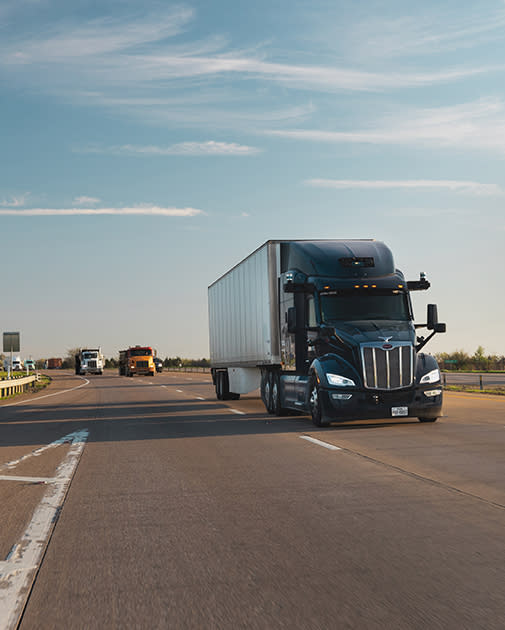I-45 will be where to find them.
Driverless trucks with no humans on board will soon cruise Texas highways if three startup firms have their way despite objections from critics who say financial pressures, not safety, is behind the timetable.
After years of testing, Aurora Innovation, Kodiak Robotics and Gatik AI expect to remove safety drivers from trucks that are being guided by software and an array of sensors, including cameras, radar and lidar, which sends pulses of light that bounces off objects. The companies have already hauled cargo for big names, such as Walmart Inc., Kroger Co., FedEx Corp. and Tyson Foods.
“At the end of the year, we anticipate getting to the point where we begin operating those trucks without drivers on board,” Chris Urmson, co-founder and CEO of Pittsburgh-based Aurora, said in an interview.
All the companies say they’re ready to deploy the technology, though they know there’s little-to-no margin for error. The risk is worth it, they say, because the technology promises to improve highway safety and lower transportation costs.
Detractors say the companies have incentive to reduce the losses that investors have been financing during the development and testing phase.
“We are concerned about the lack of regulation, the lack of transparency [and] the lack of comprehensive data collection,” said Cathy Chase, president of Advocates for Highway and Auto Safety. The list of opponents also includes the International Brotherhood of Teamsters, the 1.3 million-member union that represents drivers and warehouse workers.
[…]
At Aurora’s terminal just south of Dallas, a worker cleans sensors on top and at the side of a dark blue Peterbilt truck while a safety driver sits in the cab ready for the truck to pull out. If all goes as planned, the safety driver, whose hands now hover above the wheel without touching it while the truck is in transit, will soon no longer be needed for the 200-mile trek to Houston.
“Our intent is this is going to feel like just another day, except this day the truck’s going to head out on the road without anybody in it,” Urmson said.
[…]
Gatik AI, a Mountain View, Calif.-based startup, has already driven trucks without a driver in Arkansas and Canada. The company uses smaller, box trucks and plans to deliver from distribution centers to stores. In 2024 the company expects to deploy driverless trucks in the Dallas area “at scale,” Gatik co-founder and CEO Gautam Narang said.
Kodiak plans to “start small in 2024 and gradually ramp it up as we build confidence in the system that we didn’t miss anything,” said Don Burnette, CEO of the closely held company that he founded in 2018 that is also based in Mountain View, Calif. “We’ve seen the damage that can be done,” as in the case of robotaxis in San Francisco, he said.
The first operations without a human aboard will be short runs near the company’s truck terminal just south of Dallas and extend from there, said Burnette.
The companies have truck port partners to help with refueling their diesel-powered fleets and roadside assistance in case of a flat tire.
See here for the most recent post I have about driverless trucks, which have been running in Texas mostly on I-45 for the past couple of years. I have a couple of posts about Aurora and Kodiak, but the only mention I can find on this site about Gatik was in the context of autonomous vehicles in general. You can learn more about them at the links in the story; Aurora has a separate page for this project. They have also been in the news for some bigger ambitions.
Thousands of self-driving trucks could be on U.S. roads by 2027 following a Friday announcement by autonomous trucking firm Aurora Innovation.
Together with Continental, Pittsburgh-based Aurora said it has finalized the architecture and requirements of its Aurora Driver hardware — an important milestone that will allow the company to scale its driverless trucks and deliver them to commercial partners including PACCAR and Volvo.
Aurora plans to debut its autonomous trucks on a Dallas-to-Houston route by the end of this year.
[…]
Aurora and other trucking firms like Gatik and Kodiak Robotics have thus far used a human driver on pilot routes as a failsafe for self-driving software but aim to bring fully autonomous vehicles to Texas roadways this year. Aurora is working with Continental’s engineering team to develop a specialized secondary computer that can take over operation if a failure occurs. That’s expected to go into production in 2027.
The technology has the potential to reshape the freight industry, allowing trucks to be on the road for more than 20 hours a day and, without the need for human breaks, trim delivery time for long-haul loads by days. Companies developing autonomous programs say driverless hauling will improve highway safety and stabilize transportation costs.
Major players in the automotive and freight spaces are betting on autonomous technology to do just that: Toyota, Volvo, Uber, PACCAR and Amazon are all investors in Aurora. The firm raised $850 million last summer.
Self-driving technology could also fill gaps in the industry left by driver shortages, with as much as 90% of long-haul trucking predicted to become self-driving.
Today I-45, tomorrow the world. Getting a truck to honk its horn as you pass it on the highway may become extinct as well. We’ll see how it goes.

